With the growing spread of a new COVID-19 variant, many countries have put limits on international travel. In some cases, those restrictions are changing—and quickly.
Japan’s government took an extraordinary step this week: asking airlines not to allow new reservations for flights into the country for the rest of the month — even for Japanese citizens.
That was Wednesday — and the move came as a surprise to many.
According to Japanese media, that included the Transport Minister and the Prime Minister.
Apparently, the civil aviation bureau within the Transport Ministry reached out directly to the airlines without consulting senior officials — a step the minister called “a bit of a rough move.”
The request was quickly withdrawn after less than 24 hours — but Japan’s borders remain tightly controlled.
There’s still a limit for inbound passengers — 3,500 a day.
And all nonresident foreigners are banned.
Even before the Omicron variant, Japan kept travel restrictions in place while the virus sharply declined.
Earlier this year, vaccinations had a slow roll-out in the country — less than two months before the Summer Olympics, Japan’s vaccination rate was about 3.5% of its population.
By late November, Japan’s vaccination rate pushed past 76% — tops in the Group of Seven industrialized nations.
As for those travel restrictions, Prime Minister Fumio Kishida calls them “temporary, exceptional measures that we are taking for safety’s sake.”




